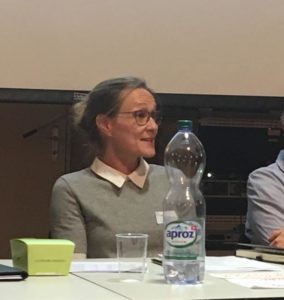An interview with Dr Pia Stalder, Associate Professor of Intercultural Management, HEIG-VD, Yverdon
 I believe you have a new spin to share on how empirical research could shift its focus to address ICC and the benefits it could bring to the research. Can you tell me a bit more about it?
I believe you have a new spin to share on how empirical research could shift its focus to address ICC and the benefits it could bring to the research. Can you tell me a bit more about it?
In most – empirical – research approaches to the subject of inter- or cross-cultural communication and competence development, scientists focus on challenges, hurdles or difficulties. The focus in their data analysis is the differences and not the commonalities among the individuals who interact in specific professional or non-professional contexts. I think that we should look for the latter; for the elements we have in common, for shared views as those allow us to build bridges, to co-construct collaboration cultures and to develop our competencies in intercultural communication, in mutual understanding. In addition, if we focus our – scientific – interest on the challenges, hurdles or difficulties, we elaborate repertoires of those instead of the practices and strategies that help in international and intercultural encounters. For those reasons, my researches tend to focus on practices and strategies that work (see e. g. the repertoire presented in my book published by Peter Lang back in 2010).
Another important point to mention when talking about fostering intercultural communication competence is the conception of “culture” (see for instance Gohard-Radenkovic & Stalder 2013). In teaching and training contexts – for students, employees, managers and so on – there is still a prevalence of narrow definitions of the culture concept as a static “whole”; a set of rules and ways of doing things (attitudes, values, norms, beliefs) passed on from generation to generation. Nevertheless, cultures are intellectual « objects », products of inventions and perceptions. They are fundamentally dynamic: cultures are co-constructed forms of organisations, constantly negotiated and renegotiated in ‘human’ interaction. This, according to Giordano (2003) means that we are all cultural actors.
One point I would like to emphasize is that fostering intercultural communication competence cannot be dis-associated from the need for some theoretical knowledge of basic communication theories and models as they help us to understand ourselves better especially the types of message we send out voluntarily and involuntarily and the ways they impact others. It also helps us to understand other people’s perspectives and multiple identities, the importance of considering the context and so on.
In one of your ongoing research projects, you investigate methods for fostering intercultural competencies in the business context, in other words « intercultural management competencies ». What exactly is this about?
The project I’m working on aims at getting a better knowledge of training methods already made available by HR of international companies and organisations – among which are individual and team coaching. My interest is also tied to the fact that I am currently completing a federal diploma in coaching and mentoring professionals working on the international stage.
So far, more than 50 people have participated in a pilot online survey I have launched and it is interesting to see that 60% of the companies for whom the respondents work, do not contribute to fostering intercultural management competencies. But more than 70% of the respondents think their employers should do so. The first survey results also show a considerable interest from the respondents in individual coaching sessions (more than 50% say they would participate in such sessions if they were offered within their institutions). Above all, more than 70% of respondents are interested in team coaching to further develop their intercultural management competencies. Nevertheless, it is too early to be conclusive as this survey is still open – in fact participation of your readership is most welcome : https://de.surveymonkey.com/r/F3KVDPT
Bibliographical references
- Giordano, Ch. (2003). Préface. De la crise des représentations au triomphe des préfixes. Dans A. Gohard-Radenkovic, D. Mujawamariya & S. Pérez (éds), Intégration des «minorités» et nouveaux espaces interculturels (pp. XI-XVII). Berne: Peter Lang.
- Gohard-Radenkovic, A. & Stalder, P. (2013). Pour en finir avec la conception ordinaire de la notion de culture…, Universitas, no 1, octobre, Fribourg : Université de Fribourg.
- Stalder, P. (2010). Pratiques imaginées et images des pratiques plurilingues. Stratégies de communication dans les réunions en milieu professionnel international. Berne: Peter Lang.
- Stalder P. (2014). Regard éloigné, regard rapproché : l’anthropologie et la linguistique au service de l’identification des stratégies de communication en milieu professionnel international. Dans L. Santone & D. Londei, Entre linguistique et anthropologie. Observations de terrain, modèles d’analyse et expériences d’écriture. Berne : Peter Lang.
- Stalder P. (2018). Management interculturel : entre théorie et anarchie. Dans P. R. Cloet, A. M. Guénette, E. Mutabazi & Ph. Pierre, Le défi interculturel. Enjeux et perspectives pour entreprendre. Paris : L’Harmattan.
- Stalder, P. & Tonti, A. (dir.) (2014). La Médiation interculturelle: représentations, mises en oeuvre & développement des compétences, Paris: Edition des archives contemporaines.
Dr Pia Stalder was interviewed by Tawakalitu Braimah
 Dr Pia Stalder is an associate professor of Intercultural Management at the School for Management and Engineering Vaud (HEIG-VD) in Yverdon. Her research and teaching/training activities aim at the development of intercultural communication competencies. She also lectures at the University of Bucharest (Department-UNESCO Chair in Intercultural and Interreligious Exchanges) and the University of Luxemburg.
Dr Pia Stalder is an associate professor of Intercultural Management at the School for Management and Engineering Vaud (HEIG-VD) in Yverdon. Her research and teaching/training activities aim at the development of intercultural communication competencies. She also lectures at the University of Bucharest (Department-UNESCO Chair in Intercultural and Interreligious Exchanges) and the University of Luxemburg.
